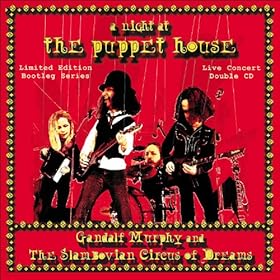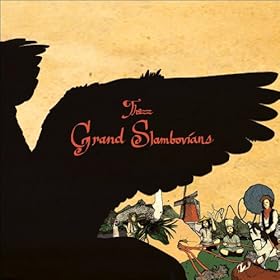|
The Slambovian Circus of Dreams: catching up with eccentricities The Slambovian Circus of Dreams has cultivated a distinct brand of eccentricity since its founding in Sleepy Hollow, N.Y., in 1998. Lead singer Joziah Longo, oddly bewhiskered and nearly always standing under a tall hat, is surprised to see the world catching up to them. "You've got to ride your own curve," he says during a telephone interview, a little bleary after an all-nighter that left him just 30 minutes to sleep before rising again. "It's interesting to us -- people will ask us to play steampunk festivals, pirate festivals, all sorts of things, that we never realized we fit into. We never tried to fit into something like that," he says. "I guess we've accepted to some degree that we're eccentric. ... But things seem to be moving in the direction that we're moving."
The band -- nee Gandalf Murphy and the Slambovian Circus of Dreams, aka The Grand Slambovians -- is somewhat fluid in its approach to music. Its name, as well. "We shift the name around from album to album," says Longo. "We figure if it's got Slambovia in it, they'll know who we are." Longo plays guitar and harmonica and is the band's primary songwriter. His wife, Tink Lloyd, is the band's Swiss army knife, pulling out accordion, cello, flute, piccolo or theremin, among other instruments, as needed. "I'm telling you, man, she picks up instruments everywhere we go," Longo laughs. "If we're in Scotland, she picks up bagpipes. ... She played cello for about a week before recording -- she had never even played a string instrument before. It keeps kind of a punk edge on things." Sharkey McEwen (lead guitar, backing vocals and mandolin) and Eric Puente (percussion) round out the band. Over the years, the band has headlined some pretty hefty venues, including Mariposa, Falcon Ridge and Xponential folk festivals. They also spend a lot of time in England, where Longo says the band has found quite a following. "It's been quite amazing," he says. "We went over for classic rock festival four years ago and played between the Zombies and the Animals. In a certain way, it's our niche. We're not sure if people always realize that, but we're a classic rock band from the '60s."
"They seem to get us on a lot of different frequencies," Longo says. "Among the boomers over there, we're kind of legendary." Longo grew up in Philadelphia, in a house full of music. "My dad and my grandfather both played," he recalls. "They were human cover bands. ... My grandfather was a dock worker, my dad was a factory worker, and they played everything from the 20th century -- '20s through the '60s. I grew up playing in the basement with them." Styles ranged from honky-tonk to old-time and country music -- even a bit of yodeling, Longo says. "When the British Invasion happened, we shifted into that as well." Longo avoided the school music scene; instead of filling a seat in the orchestra or band, he was starting bands with kids in his neighborhood by age 12. "I was on the road by 16," he says, "playing Irish social clubs and coffee houses, things like that." The band's distinctive sound was more an accident of fate than a conscious choice, Longo says.
"As a young kid, you try to be cooler than anything that's happening around you. But the music has always been pretty eclectic and wacky." Describing the band, however, is tough. They've been billed as a Hillbilly Pink Floyd. Influences range from Tom Petty and Bob Dylan to the Waterboys, Wallflowers and Decemberists. "We're somewhere between old-time country and the Beatles," Longo muses. The All Music Guide called the band "electric, folk, and swamp blues here, acid-drenched roots and garage band rock, and country-drenched pop, and that's just the beginning." Frankly, Longo has given up on searching for a label. "People hear different frequencies," he says. "None of it's exactly right. It's nonlinear music. It's music from the heart. "It tries to be sincere -- or as tongue in cheek -- as possible," he adds. "It's probably why we can't be defined. I'm not sure that helps the career commercially, but I don't know how to describe it." But good music, that he knows. "Anything that's as creative as it possibly can be and trying to affect the world in a positive way," he says. "Sometimes people just need escape. Sometimes you need music that will make you cry. ... The whole thing's the language of the heart."
"Everybody has the potential to be infinitely creative," Longo explains. "We can create ourselves out of difficult situations. There's always hope in the world, no matter how bad, how dark it gets. "Our music is about that, trying to encourage people. You can become an enlightened person and save yourself and the people around you. Just get off your ass and create." At the end of the interview, Lloyd snatches the phone. "I was getting inspired," she says. Music, she asserts, is more than just entertainment. "It serves a purpose ... to inform people, to inspire people, to galvanize people," she says. "Music has a special position in our culture, and we're definitely from that school." Ever since the 1960s, when "music changed everything," people have put music to work with a social conscience, she says. "We're trying to tap into our basic human goodness, but there's something beyond that we can tap into," Lloyd says. "A lot of our songs kind of dance around that. We're here, and things are a challenge, but there is another dimension. People come to our shows because they want to experience that dimension, not just to shake their butts. "They want to have that big, magical mindmeld with each other and the artists on stage. That's the magic that happens at live events. That's the Slambovian experience." Slambovian music is simple, she adds. "It's not complicated, but there's a lot of nuance. I think that's why people like us," she says. She pauses. You can almost hear her smile. "That's all I wanted to say." [ visit the artist's website ]  |

Rambles.NET interview by Tom Knapp 24 May 2014 




|




